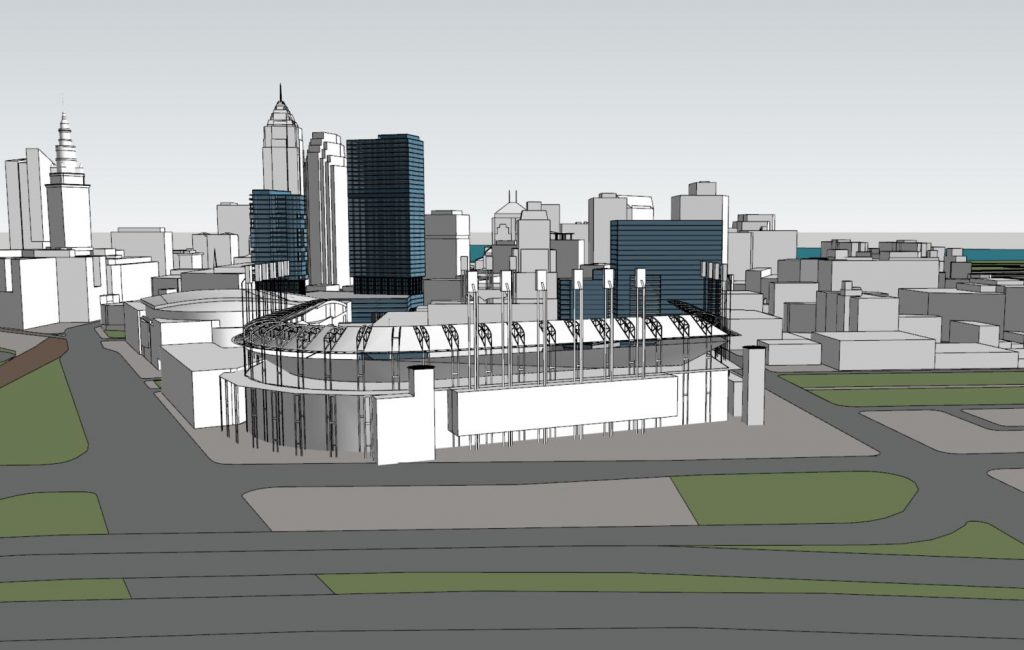Presidential candidate Ross Perot in 1992 famously referred to a “huge sucking sound” when it came to jobs leaving the USA. When money starts pouring into a city like Cleveland, it ought to make a sound, too. It is, and people are noticing.
Since the late 20th century, capital investment in Cleveland typically came from wealthy Clevelanders who loved their community and wanted to give something back to it. It was done in the name of altruism, not a healthy return. Indeed, local real estate investors who had to answer to out-of-town shareholders — especially the highly demanding folks on Wall Street — could never hope to justify investing in Cleveland. It’s why publicly traded firms like Forest City Enterprises had stopped investing locally and instead directed their efforts toward coastal markets plus a few booming inland cities like Atlanta, Chicago, Dallas and Denver.
But nothing ever stays the same. Real estate markets get over-crowded with investors and overheat. Some get overbuilt. That’s when real estate investors start looking for the next big thing. And they start looking for bargains.
Enter Cleveland. And, to be fair, enter other Rust Belt cities that were also economic drivers of the late 19th and early 20th centuries whose momentum carried their growth briefly into the second half of the 20th century. Buffalo, Cincinnati, Detroit, Milwaukee, Pittsburgh, St. Louis and others are joining Cleveland, in part because of what they gained as the economic powerhouses of the industrial revolution. Their wealthy benefactors plowed riches into libraries, parks, museums, performing arts, institutions of higher learning and other assets that approach or even exceed those of the nation’s top-tier cities. Nearly all of these cities still possess and support those assets.
And that’s why, when coastal bargain hunters began looking for a good investment, they found Cleveland. Of course, you can’t make money just by owning something cheap. There has to be a realistic hope for growth.
In doing an e-mail survey of real estate developers and entrepreneurs, they are noticing a big change in out-of-state investment in Cleveland. This is also borne out in the voluminous list of hot-linked headlines shared below. What do investors say is the reason? Greater Cleveland’s positive job reports.
We locals sometimes question the validity and usefulness of those reports because we see the story on the ground, especially on Cleveland’s troubled East Side. But out-of-state investors really do pay attention to this data. They are predicting population gains, so they are partnering with developers and entrepreneurs to try to get in on this market early.
Cleveland’s job market has shot up in 2018 (includes the latest October data, which continues to show strong, steady growth) in all sectors except information technology and “other services.” Job growth in Greater Cleveland is now increasing at a pace that ranks it with some of the fastest-growing metropolitan areas in the USA. The Web site Livability.com recently announced that Cleveland ranked in the top 10 nationally among cities that had more jobs available than people to fill them. Global real estate firm CBRE ranked Cleveland 8th nationally in technology and talent growth “momentum markets.”
Respondents to my e-mail survey cautioned that capital is not transferring away from the coasts. There are no signs that development is slowing in coastal cities as well as a few inland cities like Atlanta, Denver or those in Texas. Instead, it appears that investors are trying to diversify, and Cleveland, Pittsburgh and Detroit offer great opportunities to do that at a fraction of the cost of the coasts. Put it this way, respondents say they are more confident in the futures of Cleveland, Pittsburgh and Detroit than Chicago. They feel Chicago is building a bit of a bubble while its smaller Midwest neighbors still have huge growth potential and pent-up demand. Plus the image of Cleveland is definitely starting to change.
So investors are branching out into newer markets because of the overcrowding and cost of land in some of the East Coast markets. Insiders confirm that investors want to continue to put money in the Northeast markets because they are stable, but the opportunities are growing in the Midwest, and they are feeling very confident about diversifying their investments by putting money into the old Rust Belt powerhouses.
And it’s not just Cleveland’s residential projects that are attracting out-of-state investors. They’re industrial and entrepreneurial projects as well.
Put simply, investors can get more for their money here, most say. They can buy and hold and get good returns versus markets with higher barriers to entry like on the coasts, and whose value is largely driven by investors from out of the country. They are at risk of a bubble and may already be over-priced.
Lastly, demographics here in Cleveland are starting to change slowly and, if they really pick up, these investors will be poised for even better returns should they stay or exit the market and sell the assets they’ve acquired. This is particularly visible when it comes to industrial properties around the area and the general lack of good industrial space that suits the needs of end users.
But don’t depend on the word of unnamed sources. Look at the totality of recent actions by investors, not to mention the quality of their actions. They range from examples of direct investments in projects, to the opening and expansion of offices locally.
I don’t expect readers to open all of these links and to read all of the articles (you can, if you want). But the story told by the totality all of these headlines is compelling…
- 11-13-18 / Arcapita of Bahrain teams up with homegrown landlord Weston Inc. to buy seven suburban industrial buildings
- 11-13-18 / Real estate investment-advisement firm Raider Hill Advisors expands to Cleveland?
- 11-07-18 / Dealmaker’s guide to 15 cities where M&A thrives
- 11-06-18 / Bay Area tech startup sees a rent-to-own housing solution ? just not here, invests in Seattle, Memphis, Atlanta, and Cleveland instead
- 10-26-18 / Dallas M&A firm Generational Equity opens office in Cleveland where outsourcing companies are booming
- 10-03-18 Santander Bank of Spain quietly enters Ohio market with Cleveland loan production office
- 09-11-18 / Align Capital buys Cleveland’s enterprise asset management firm Predictive Service, merges it with Lewellyn Technology
- 09-09-18 / CBRE Group adds jobs to Cleveland, Akron offices to keep up with growth
- 06-24-18 / Biomedical investment growing in Cleveland, Midwest
- 03-09-18 / A dozen companies selected for Plug and Play Cleveland accelerator
- 01-28-18 / Banks feeling the draw to Northeast Ohio to break into market
- 01-09-18 / Courtland Partners of Cleveland agrees to be acquired by New York real estate investment firm, from among many suitors
- 11-26-17 / Bank of the West sees Cleveland region as growth zone
- 10-10-17 / Pennsylvania’s NexTier Bank expands into Ohio with Cleveland market loan office
- 08-13-17 / Historic investment aims to bring opportunity, prosperity
- 08-10-17 / SunTrust Bank opens commercial banking offices in Cleveland, Cincinnati
- 07-31-17 / Fund That Flip plans to expand in Cleveland
- 07-30-17 / Investors starting to shower their love on Cleveland
- 05-17-17 / Marcus & Millichap?s IPA division launches Midwest Multifamily Group, bases its HQ in Cleveland
- 05-02-17 / Citizens Bank buys Cleveland M&A advisory firm Western Reserve Partners
- Haslams announce Brook Park stadium-area development partner, updated plans
- Old Brooklyn structures OK’d for demolition
- Shoreway Tower has construction in view for 2025
- North Collinwood ‘historic’ modular townhomes OK’d
- Tick Tock Tavern closing after 75+ years
- Gordon Square development wins approval














Cleveland is surging man iam so excited about the future for this true world class city